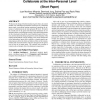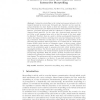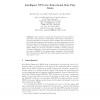354 search results - page 5 / 71 » Learning Character Behaviors Using Agent Modeling in Games |
130
click to vote
CORR
2010
Springer
15 years 1 months ago
2010
Springer
In this paper, we address the problem of creating believable agents (virtual characters) in video games. We consider only one meaning of believability, "giving the feeling of...
113
click to vote
ATAL
2008
Springer
15 years 3 months ago
2008
Springer
We discuss the design of the Intermediary Agent's brain, the control module of an embodied conversational virtual peer in a simulation game aimed at providing learning experi...
117
click to vote
EDUTAINMENT
2007
Springer
15 years 7 months ago
2007
Springer
Interactive storytelling in the virtual environment attracts a lot of research interests in recent years. Story plot and character are two most important elements of a story. Based...
143
click to vote
AGS
2009
Springer
15 years 7 months ago
2009
Springer
Video games in general and educational role play games in particular would increase in believability if Non Player Characters reacted appropriately to the player’s actions. Reali...
109
click to vote
CIG
2005
IEEE
15 years 6 months ago
2005
IEEE
AbstractGroup utility functions are an extension of the common team utility function for providing multiple agents with a common reinforcement learning signal for learning cooperat...



